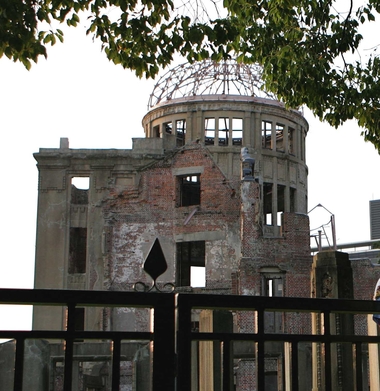Japan calls on leaders to follow Obama and visit Hiroshima

Tokyo (AP) — Japan marked the 71st anniversary of the atomic bombing of Hiroshima on Saturday by renewing calls for a nuclear weapons free world and urging leaders to follow the example of President Barack Obama and visit the bomb sites.
Quoting part of Obama's speech in Hiroshima in May, Mayor Kazumi Matsui urged countries with nuclear weapons to "have the courage to escape the logic of fear, and pursue a world without them."
"We need to fill our policymakers with the passion to solidify this unity and create a security system based on trust and dialogue," he said. "To that end, I once again urge the leaders of all nations to visit the A-bombed cities."
Like Obama's, he said that such visits "will surely etch the reality of the atomic bombings in each heart."
About 50,000 people attended the ceremony at Hiroshima's Peace Park near the bomb's epicenter.
Obama became the first sitting U.S. president to pay tribute to those killed by the world's first atomic bomb that was dropped by the U.S. to force Japan's capitulation in World War II.
The mayor also cautioned Prime Minister Shinzo Abe against his push to revise Japan's war-renouncing constitution to give more power to the Japanese military. He urged him to join Obama in taking the leadership toward ridding the world of nuclear weapons.
"A nuclear weapon-free world would manifest the noble pacifism of the Japanese Constitution," he said.
Abe said in his speech that Japan, as the only nation to have suffered from the atomic bombings, will stick to its non-nuclear principles, while making further efforts toward a nuclear-free world by promoting cooperation between nuclear and non-nuclear states and encouraging world leaders and young generations to see Hiroshima's reality.
The Aug. 6, 1945, bombing killed 140,000 people. Another atomic bombing three days later in Nagasaki killed more than 70,000 people.
More than 300,000 of the "hibakusha," or survivors, have died since, including 5,511 in the past year. The average age of the survivors is now over 80 years. Many suffer from long lasting radiation effects.
By Mari Yamaguchi, Associated Press. Copyright 2016 The Associated Press. All rights reserved. This material may not be published, broadcast, rewritten or redistributed.
The Gayly – August 6, 2016 @ 2:40 p.m.





